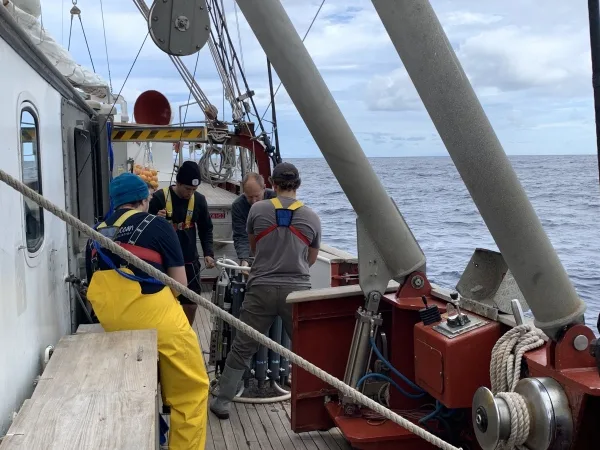Programs Blog
Boat Time

Author: Itai Bojdak-Yates, Lawrence University
Ship’s Log
Current position
Lat 27° 38.6’ N, Lon 126° 09.0’ W (600 nautical miles west of Baja California)
Weather / Sail Plan
Hove to (stopped) for science under the fore and main staysails; Fresh breeze out of the northeast, mostly cloudy
Taffrail Log
584.4 nautical miles
We continue to sail (motor) south towards the tropics and fairer winds. This morning the winds picked up for the first time in a bit, and the seas soon followed suit. At the time of writing we’re focused on science deployments (the carousel and tow nets), but we’ll soon get underway again. We might even get some help from the wind (and relief for our poor flapping sails!). It’s warmer and sunnier in these high-pressure latitudes, which has been nice for all of us on deck.
One of the many things that changes when one goes to sea is one’s perception of time. We live on an 18-hour watch cycle – 6 hours on, 12 hours off – every day of the week. The conventional week structure is mostly meaningless out here. Instead, we stand watch in the afternoon, get a good night’s sleep, then stand watch again the following morning. (We call this our “Friday”.) We then have the afternoon off before going to bed early. The following morning/night we wake up at 0030 (12:30 am) to stand dawn watch, then nap during the day before standing night watch from dinner until 0100 (1 am). Finally, we sleep in the following morning, and the three-day cycle begins again with the afternoon watch.
The result of these watches is an unusual sense of time. Some days are extremely long, some are quite short; somebody is sleeping at most hours of the day; food is put out at midnight (“midrats”, or midnight rations); and it becomes unbelievable that we’ve only been underway for about five days. The watch cycle allows for some unique experiences as well: watching the full moon set over the ocean, going to bed at 0730 (7:30 am), lounging on deck in the afternoon, towing nets and sorting zooplankton by red lights at night. It leaves us more fully in the moment, untethered from many of the time constructs we use on land.
We’ve all mostly settled into this cycle, and we’re taking up a bit more responsibility on board as we move towards the next phase of this adventure.
Much love to all those on land.
– Itai
Contact: Douglas Karlson, Director of Communications, 508-444-1918 | dkarlson@sea.edu
Recent Posts from the Ships
- Ocean Classroom 2024-A collaborative high school program with Proctor Academy
- Collaborations and Long-term Commitments: SEA’s Caribbean Reef Program Sets a Course for Coastal Programs that Compliment Shipboard Experiences.
- Sea Education Association students prepare for life underway using state of the art nautical simulation from Wartsila Corporation.
- SEA Writer 2022, Magazines From the Summer SEA Quest Students
- Technology@SEA: Upgrades Allow Insight into Ocean Depths
Programs
- Gap Year
- Ocean Exploration
- High School
- Science at SEA
- SEA Expedition
- SEAScape
- Pre-College
- Proctor Ocean Classroom
- Protecting the Phoenix Islands
- SPICE
- Stanford@SEA
- Undergraduate
- Climate and Society
- Climate Change and Coastal Resilience
- Coral Reef Conservation
- Marine Biodiversity and Conservation
- MBL
- Ocean Exploration: Plastics
- Ocean Policy: Marine Protected Areas
- Oceans and Climate
- Pacific Reef Expedition
- The Global Ocean: Hawai'i
- The Global Ocean: New Zealand